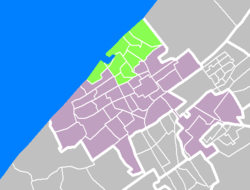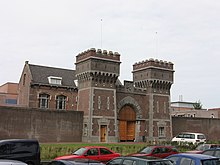Scheveningen
 flag |
 coat of arms |
| province |
|
| local community |
|
| Residents | 55,976 (Jan. 1, 2017) |
| Coordinates | 52 ° 6 ′ N , 4 ° 16 ′ E |
| Important traffic route |
|
| prefix | 070 |
| Postcodes | 2583-2587 |
| Location of the Scheveningen district in The Hague | |
Scheveningen [ ˈsxeːvənɪŋə (n) ] ( ) is a district of The Hague , six kilometers from the center. From a small fishing village it has developed into the largest seaside resort in the Netherlands .
Scheveningen has a fishing - port and a long beach promenade with shops, restaurants, sun terraces and an aquarium . The main attractions are the miniature city of Madurodam , as well as a 381 m long pier with an observation tower and ferris wheel. The Museum Beelden aan Zee shows modern sculptures, also in an open space along the boulevard. The Kurhaus am Strand was built between 1884 and 1885 and is a listed building . The Holland Casino has a branch here. A popular cycle path leads from the northern end of Scheveningen to Katwijk (about twelve kilometers). From here you can also continue on the coast to Noordwijk and Zandvoort .
The dune areas Oostduinpark and Meijendel adjoin the north-eastern district boundary ; in the southwest, in the direction of Kijkduin , the Westduinpark is another dune area with a sandy beach in front of it.
Scheveningen can be reached from the center of The Hague via several tram lines .
The word Scheveningen is a popular Dutch shibboleth .
history

The period of the first settlement of Scheveningen is unknown. The suffix -ingen , as in other Dutch places, indicates a foundation in the 10th or 11th century. The Scheveningen country is mentioned for the first time in a register in 1284 as the Sceveninghe terram . In the course of the 13th century, the residence of the Counts of Land established itself in neighboring The Hague . The increasing demand for fish meant that more and more fishermen had settled on the nearest coast. A count's decision in the late Middle Ages meant that Scheveningen could not become independent until today, but was always represented with a seat on the city council of The Hague.
The village of Scheveningen has been repeatedly destroyed by floods. During the All Saints flood in 1570, half the village disappeared in the waves. In 1640, according to a census, there were 917 people in the village who lived in 200 houses, including 250 people employed in fishing. In 1653 the sea battle at Scheveningen took place . Like the other communities along the Dutch North Sea coast with its sweeping, flat sandy beaches, the place had no harbor. Until the middle of the 19th century, the fish had to be reloaded into small bomschuit at sea . The construction of the first protected port facility became necessary after the focus was increasingly on driftnet fishing for herring and the catches could be increased significantly. The fishing village of the 19th century can be seen in a painting 120 meters in circumference in Panorama Mesdag at Zeestraat 65, The Hague.
The first bathhouse opened in 1818. It was a small wooden building with a small waiting room and four bathrooms with an ocean view. As early as 1820 it was replaced by a stone building, which was expanded in 1828 by a larger complex with a main house and two side wings. The previously municipal bathhouse was converted into a hotel and crowned with the new Kurhaus in 1884 . This Italian Renaissance style building burned down on September 1, 1886, but was immediately rebuilt. Since then, the number of guests has grown steadily and numerous new hotels have sprung up along the coast. From 1907 to 1953 Scheveningen was the terminus of the Hofplein railway line , which became unprofitable and discontinued with the advent of road traffic and the expansion of the road system.
Like many other places on the North Sea, Scheveningen was declared a restricted area during the Second World War and was evacuated in 1942. The Germans feared an invasion over the North Sea coast and decided to build the Atlantic Wall , which should extend from the North Cape to the French-Spanish border. Much of the building was demolished and replaced with stone walls and trenches. A massive concrete wall was erected on the promenade as an anti-tank barrier on the other side of the moat. In Scheveningen there was a prison (Penitentiaire Instelling Haaglanden), which was known as the Oranjehotel from 1940 to 1945 as the place where the Gestapo detained resistance members. Today it is again the Penitentiaire Inrichting Haaglanden for 1000 prisoners. The United Nations Detention Unit , the prison of the UN War Crimes Tribunal and the International Criminal Court is also located here . This prison serves as an institution for the execution of pre-trial detention against the defendants of both courts.
Today Scheveningen is an internationally renowned holiday resort with twenty larger hotels, a spa house, Holland Casino , fishery, harbor and thus a travel destination for many day-trippers and numerous foreign tourists. A sand sculpture competition is held once a year. The New Year's swim, which has been carried out since 1951 and in which over 10,000 mostly young people take part , is known far beyond the borders .
Culture and sights
Attractions
- Oude Kerk ( Old Church ): Late Gothic Reformed Church from the 15th century.
- Kurhaus Scheveningen
- Madurodam miniature park
- Sea Life Scheveningen
- Westbroekpark
- The beach
- The pier
- The harbor
Museums
- Muzee Scheveningen
- Atlantic Wall Museum Scheveningen
- Museum Beelden aan Zee
- Panorama Mesdag in The Hague : Panorama painting from 1881 with a view of the beach and the seaside resort of Scheveningen
gallery
Sons and daughters from Scheveningen
- Adriaen Coenen (1514–1587), North Holland fishmonger with an interest in biology
- Isaac Sailmaker (around 1633-1721), painter of the Baroque period
- Jan Postma (1895–1944), communist
- Samuel Elzevier de Jongh (1898–1976), pharmacologist
- Frits van Dongen , born in Hein van der Niet (1901–1975), actor
- Jan van Baal (1909–1992), ethnologist and governor of Dutch New Guinea (1953–58)
- Louis Joseph Moyse (1912–2007), French flautist and composer
- Maarten Vrolijk (1919–1994), journalist, poet and politician (PvdA)
- Hans Heinrich Thyssen-Bornemisza de Kászon (1921–2002), entrepreneur and art collector
- Jon van Rood (1926-2017), immunologist
- Jan Pronk (* 1940), politician and diplomat
- Romy Haag (* 1948), singer, dancer and actress
- Theo Jansen (* 1948), artist
- Bert Pronk (1950–2005), racing cyclist
- Tim Smit (* 1954), British businessman, record producer, horticulturist and archaeologist
- Dick Jol (born 1956), football referee
- Frédérique Huydts (1967–2006), actress
Others
A chess opening variant of the Sicilian Defense is named after the place.
Web links
- Scheveningen on the official website of the municipality of The Hague (Dutch)
- Tourist website (German)
- Scheveningen In: denhaag.com (German)
- Scheveningen In: holland.com
Individual evidence
- ↑ Bevolking Gemeente Den Haag - Buurtmonitor, accessed on May 27, 2018 (Dutch)
- ^ History of Scheveningen. (No longer available online.) Archived from the original on October 26, 2011 ; Retrieved February 5, 2011 (Dutch). Info: The archive link was inserted automatically and has not yet been checked. Please check the original and archive link according to the instructions and then remove this notice.
- ↑ Grafenberg / Hetzel: CityTrip The Hague with Scheveningen . Reise Know-How Verlag Peter Rump GmbH, Bielefeld 2005, ISBN 978-3-8317-1915-0 .
- ^ Video New Years Swimming 2011. Accessed February 5, 2011 .
- ^ Sea Life Scheveningen. In: scheveningenbeach.com. Retrieved April 7, 2018 .
- ↑ Official website of Sea Life Scheveningen (English, Dutch)
- ^ Westbroekpark Scheveningen. In: scheveningenbeach.com. Retrieved April 7, 2018 .
- ↑ Scheveningen beach. In: scheveningenbeach.com. Retrieved April 7, 2018 .
- ^ Pier Scheveningen. In: scheveningenbeach.com. Retrieved April 7, 2018 .
- ↑ Scheveningen harbor. In: scheveningenbeach.com. Retrieved April 7, 2018 .
- ↑ Muzee Scheveningen. In: scheveningenbeach.com. Retrieved April 7, 2018 .
- ↑ Official website of the Muzee Scheveningen (Dutch)
- ↑ www.atlantikwallmuseum.nl/de











